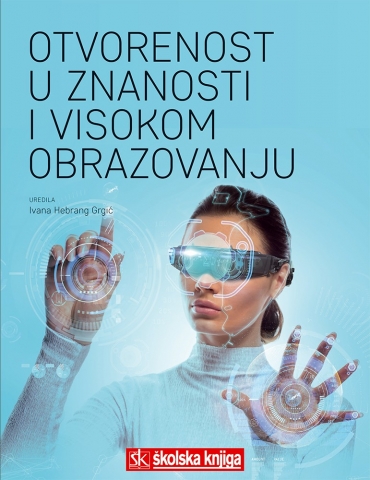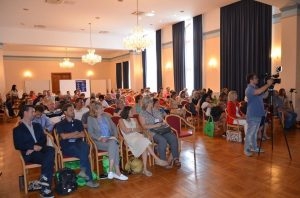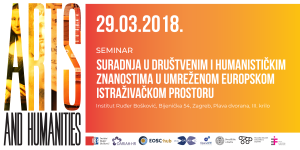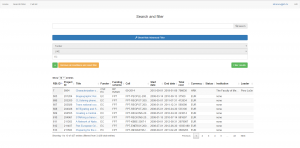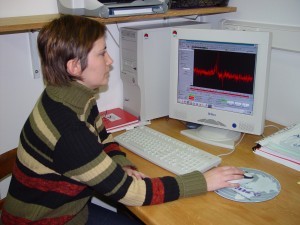
National Open Access Desk

-
Overview
Support and Landscape
Croatia is part of the European Research Area (ERA) and supports open science through different Open Access initiatives. Numerous bottom-up initiatives at the national level make Croatia a vibrant OA environment. Open Access movement started in Croatia in 1997 with the Croatian scientific bibliography CROSBI introducing OA repository functions from the very beginning. Since then, several OA national initiatives started like Who’s Who in Science in Croatia, HRČAK repository of the Croatian OA journals, ŠESTAR repository of the scientific equipment, DABAR infrastructure for OA institutional repositories, etc.
There are nine public universities (Zagreb, Split, Rijeka, Osijek, Zadar, Dubrovnik, Pula and Slavonski Brod) and 30 public and private polytechnic institutes, with more than 180.000 students enrolled. Research in Croatia is also conducted by 25 public institutes and six technology centres. There are approximately 11.500 active researchers in Croatia. The largest university in Croatia is the University of Zagreb with more than 70.000 enrolled students, and the largest research institute is Ruđer Bošković Institute with more than 550 researchers.National Initiatives
Three public bodies play a major role in the consolidation of the research at the national level in terms of:
• strategy with the Ministry of Science and Education (MSE)
• funding with the Croatian Science Foundation (HRZZ)
• development and assessment with the National Council for Science, Higher Education and Technological Development (NCSHETD) and Agency for Science and Higher Education.Croatian Ministry of Science and Education (MSE) is the primary national policy-maker, responsible for planning, funding and the research assessment. The Advisory board of the Croatian Ministry of Science and Education is the National Council for Science, Higher Education and Technological Development (NCSHETD), responsible for the development of science. Expert body of NCSHETD is the Agency for Science and Higher Education which proposes criteria for budgetary financing of scientific activity and higher education. The dialogue among national key-players concerning open science agenda should be continuous.
Croatia implements several instruments, programs and policies intending to develop a substantial and strategic research policy, such as Strategy of education, science and technology (in Croatian), Croatian Research and Innovation Infrastructures Roadmap and Strategy for Fostering Innovation of the Republic of Croatia 2014-2020, aiming to provide recommendations for the establishment of a comprehensive R&I environment, to strengthen the Croatian national innovation system (NIS) and provide an efficient framework to foster the competitiveness of Croatian R&D and economy in general, through innovation and technological development. There are some mentions of Open Access in the Croatian strategic documents. Still, in general, Croatian strategic documents are not considering Open Science agenda and Open Access to scientific publications and research data.Croatian Science Foundation (CSF) is the central institution for funding competitive research projects since 2009. It provides support to scientific, higher education and technological programs and projects, fosters international cooperation, and helps the realization of scientific programs of particular interest in the field of fundamental, applied and developmental research. CSF also develops and implements various sets of financial instruments for a research career, including post-doc fellowships.
Another funder is Croatian Agency for SMEs, Innovations and Investments (HAMAG-BICRO) was founded by the Croatian Government in 1998, to support the development of small and medium-sized enterprises, improving the innovation process and encouraging investments. It is a central institution in the national innovation system for supporting innovation and technology advancement. The Agency’s main objective is the strategic creation of a unified system that would provide support to entrepreneurs through all development stages of operation starting from research and development of an idea to commercialization and placement on the market.
More details on R&I system in Croatia for 2015, including relevant policies and funding, with particular focus on topics critical for EU policies, can be found in RIO Country Report 2015 Croatia.
Data on Croatian research output related to the researchers, organizations, and research grants are available via the Croatian Scientific Bibliography CROSBI and used for research evaluation. Research libraries offer support to researchers regarding open access to publications and research data by building and managing open science infrastructure, enabling them the compliancy with Article 29.2 of the H2020 grant agreement.
-
Overview
{article 1885}{/article}Support and Landscape
{article 1887}{/article}National Initiatives
{article 1888}{/article}
-
Open Science Policy
National Policy
{article 1891}{/article}Funder policy
{article 1893}{/article}Institutional Policy
{article 1892}{/article} -
Infrastructure & EOSC
Key networks & Aggregators
{article 1886}{/article}
Data repositories
{article 1896}{/article}
National publishing initiatives
{article 1894}{/article}
National agreements with publishers
{article 1898}{/article}
OA books
{article 1895}{/article}
-
Training & Support
There are many institutions which are actively engaged in the promotion of OA, OS and ORDM, especially through the participation in the development and maintenance of the DABAR infrastructure, but a few need to be highlighted, especially because of their involvement in EU projects.
The RBI participated and still participate in many OA and OS related EU projects (OpenAIRE plus, FOSTER, EGI-Engage, OpenAIRE 2020, OpenAIRE Advance, EOSC-hub, NI4OS) as well as in the development of the national infrastructure for hosting digital repositories - Digital academic archives and repositories - DABAR. Additionally, the RBI has implemented and/or participated in the implementation of the important Croatian OA and OS infrastructures such as CROSBI, HRČAK, Who is who in science in Croatia, Šestar, FULIR and DABAR. Through all these activities the RBI provides support to researchers as well as play an important role in the infrastructure development for OA and OS on the national level. It also organizes workshops and webinars on OA, OS and ORDM and provides support for researchers at the national level through the OpenAIRE NOAD activities and its participation in the development of the DABAR infrastructure. The RBI also organizes workshops and lectures on OS and related topics as a part of the Open Access Week, KEKS workshops, Colloquia of the Centre for Scientific Information, RBI’s Open Day(s) (intended for the general public) and in its other activities. Papers and presentations on OS and OA are stored in the FULIR. Information on OS and all aspects of OA will be soon available at the national Open Science Croatia portal.
SRCE supports OA and OS through the development of the DABAR infrastructure, HRČAK journal repository, PUH service, training on OA, and ORDM, and through the promotion of best practices in research data sharing as a Croatian National Research Data Alliance (RDA) node. It also participates in EU OA and OS related projects like EOSC-hub and NI4OS.
FHSS participated in several open research data projects - SERSCIDA, Seeds and CESSDA ERIC. It also organizes events on OA and ORDM and participates in the development of the DABAR infrastructure. Since December 2019, when the Croatian Social Science Data Archive was launched, Croatia has become a CESSDA member and FHSS service provider.
The University of Zadar, in the collaboration with the University of Zagreb and Ruđer Bošković Institute, organize an annual international conference on the scholarly communication in the context of open science PUBMET. All materials of the previous conferences are available at http://pubmet.unizd.hr.
-
Statistics
{include_countrynumber PUB HR} OA publications in {include_countrynumber DATASRC HR} repositories -
News
28 November 2018The book “Openness in science and higher education” has been published – in Croatian but the preface and abstracts are available in English – and presented at the PubMET conference The book consists of 19 chapters written by 31 authors who are scholars and professionals from various fields and who deal with some form of openness in their everyday work. Editor o...28 November 2018The fifth PUBMET2018 conference, the Croatian national OpenAIRE event, took place on September 19-21, 2018 in Zadar, Croatia. The surroundings – three thousand years old Mediterranean city - were well suited for our discussions about open science. Participants from different countries such as Netherlands, Italy, Ireland, Latvia, Hungary, Germany, Poland, Spain, Great Brit...23 April 2018Followed by several meetings of the OpenAIRE-Advance and EOSC Hub teams at Ruđer Bošković Institute , a seminar on "Cooperation in Social Sciences and Humanities in a Networked European Research Space" was held at the Teleconference Hall on Thursday, March 29, 2018. Four European projects in the field of humanities and social sciences - DARIAH-HR, CESSDA, OpenAIRE-Advance and EOSC Hub - were prese...12 February 2017Usage of the unique object identifiers is crucial for accomplishing interoperability between different web services and platforms. OpenAIRE has made great progress in linking EC funded projects with publications and research data on the EU level by indexing harvested data and making that information available through the API. In Croatia, we use this API to get the updated project information and b...07 February 2017For a small academic and research community like Croatia it is important to build national collaborative infrastructure at different levels and for different purposes. Institutional repositories are for last twenty years an important strategy for attaining open access, and provide a key infrastructure for the long-term preservation of digital materials. Apart from HRČAK repository of OA journals (...24 April 2015As of April 17, 2015, all papers produced by Rudjer Boskovic Institute (RBI) researchers must be submitted to the institutional OA repository FULIR (which is OpenAIRE compliant) upon acceptance for publication. The first institutional Open Access mandate in Croatia is based on the Croatian Open Access Declaration (October 2012), „Recommendation on access to and preservation of scientific inform...

funding from the European
Union's Horizon 2020 Research and
Innovation programme under Grant
Agreement No. 777541.
